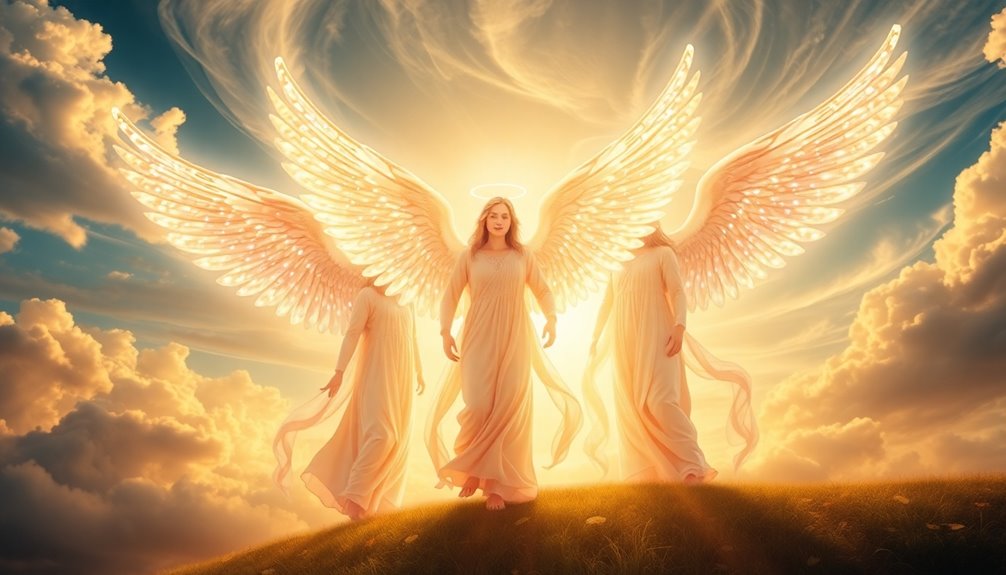Archangels are powerful celestial beings found in various religious traditions, especially Christianity and Judaism. You can think of them as chief angels, each with unique roles. For example, Michael is known for protection, Gabriel for delivering messages, and Raphael for healing. Their significance is rooted in biblical texts, but different faiths recognize them differently. Archangels provide support in daily life, helping you navigate challenges through prayer and mindfulness. They symbolize guidance and strength, enhancing your spiritual journey. If you keep exploring, you'll discover even more about their rich history and the various ways they can influence your life.
Key Takeaways
- Archangels are chief angels recognized in various religious traditions, particularly Christianity, and include Michael, Gabriel, and Raphael.
- They serve distinct roles: Michael as protector, Gabriel as messenger, and Raphael as healer.
- The term "archangel" appears in the New Testament, specifically in 1 Thessalonians and Jude.
- Different faiths recognize various archangels, with Judaism acknowledging seven and Islam emphasizing Jibrail and Mikail.
- Archangels provide spiritual support, and specific ones are invoked for protection, clarity, and healing in daily life.
Introduction
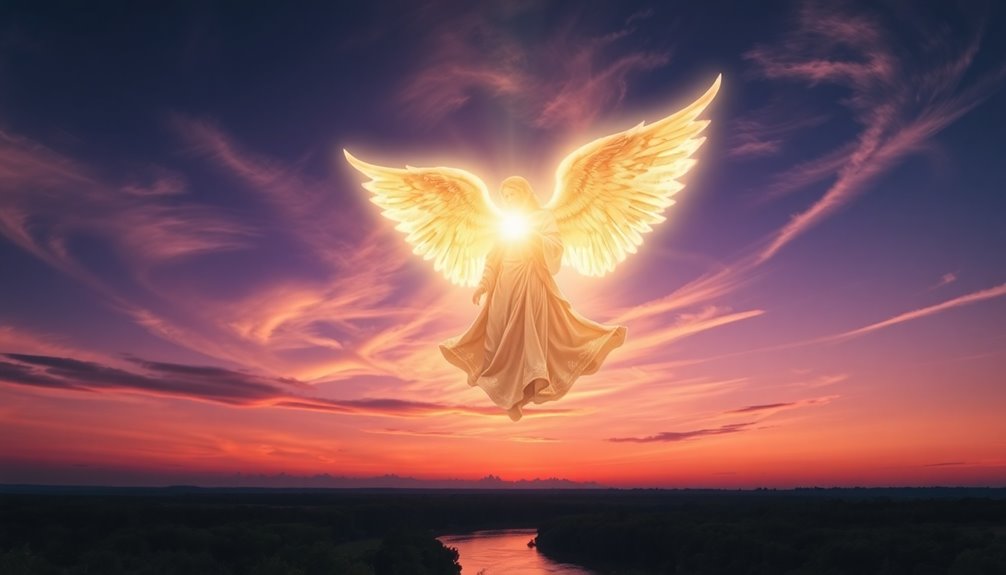
Archangels hold a prominent place in many religious traditions, serving as powerful spiritual figures that guide and protect humanity. These high-ranking beings, derived from the Greek term "archángelos," meaning chief angel, occupy a significant role within the angelic hierarchy.
In the Catholic Church, you'll find archangels recognized as essential components of faith, particularly Michael, Gabriel, and Raphael. Each one embodies unique attributes and responsibilities; Michael stands as a protector and warrior, Gabriel serves as a messenger, and Raphael is known for healing.
Though the Bible only mentions archangels explicitly in a couple of verses, their impact on spirituality is profound. The concept was systematized by Pseudo-Dionysius the Areopagite in the 5th or 6th century, enriching the understanding of these divine beings.
While Uriel appears in some texts, he isn't widely accepted in the major denominations. The recognition and veneration of archangels vary across different religious contexts, with some traditions celebrating specific feast days dedicated to them, like September 29, when Michael, Gabriel, and Raphael are honored.
Understanding archangels deepens your appreciation for their roles in spiritual life.
Biblical Archangel References
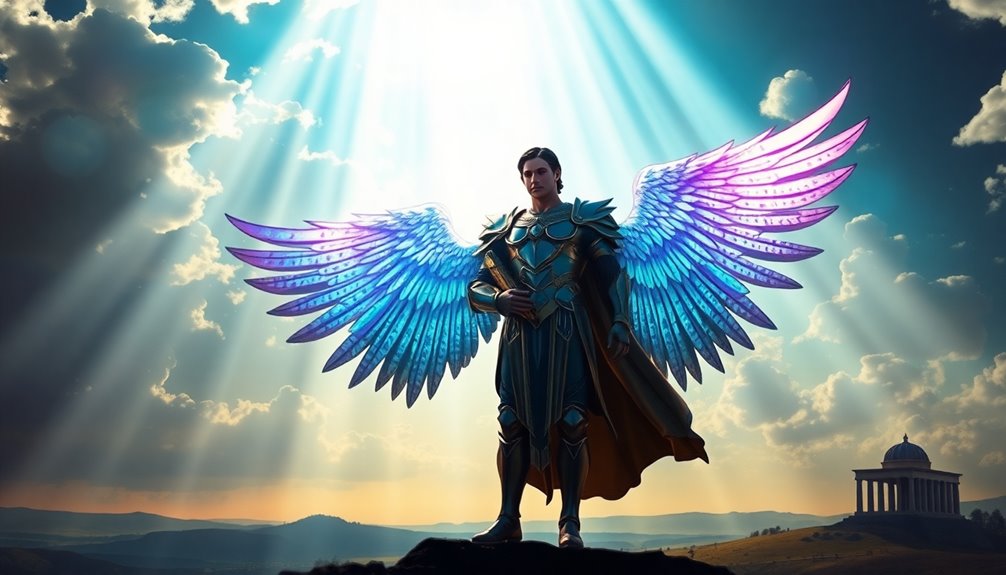
When you look at the Bible, you'll find the term "archangel" mentioned in a couple of key passages, specifically in 1 Thessalonians and Jude.
Michael stands out as the only angel explicitly called an archangel, while Gabriel plays a crucial role as a messenger.
Exploring these references helps you understand the significance of these celestial beings in biblical narratives.
Primary Bible References
In the Bible, archangels hold a distinct rank among the celestial beings, with specific references that highlight their roles and significance. The term "archangel" appears explicitly in two verses: 1 Thessalonians 4:16 and Jude 1:9. These verses indicate a unique status among angels, with Michael being the only angel explicitly labeled as an archangel in Scripture.
In Daniel 10:13 and Jude 1:9, Michael is portrayed as a protector and leader of heavenly armies.
Gabriel, while significant in delivering divine messages, such as the Annunciation to Mary in Luke 1:26-38, isn't designated as an archangel in the biblical text. His role as a messenger underscores the importance of communication between God and humanity.
Raphael is mentioned in the apocryphal Book of Tobit, where he serves as a healer and guide. However, he isn't included in the canonical texts recognized by all Christian traditions.
Secondary Bible References
The role of archangels extends beyond the primary references in the Bible, with several secondary mentions that shed light on their significance. While Michael the archangel is the only named archangel in canonical Sacred Scripture, his presence is further emphasized in texts like the Book of Enoch. This ancient work discusses Michael's role as a protector and leader among angels and archangels, highlighting his importance in the celestial hierarchy.
Gabriel, often associated with delivering God's messages, plays a critical role in biblical narratives, such as the Annunciation to Mary. However, he isn't explicitly labeled as an archangel within the Protestant Bible.
Raphael is another figure recognized as an archangel in Catholic tradition, notably in the Book of Tobit, though absent from the Protestant canon.
Uriel, linked to wisdom, appears in apocryphal texts like 2 Esdras but isn't included in the Bible.
These secondary references enrich your understanding of angels and archangels, illustrating the broader context in which these celestial beings operate and their roles in divine communication and protection.
Ancient Angelology Traditions
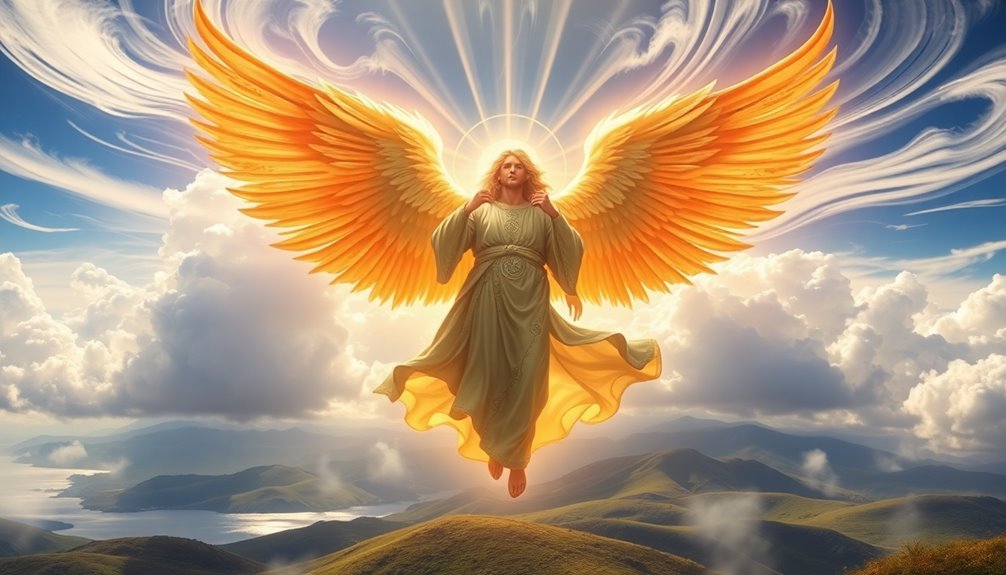
Ancient angelology traditions reveal a rich tapestry of beliefs regarding celestial beings, particularly within Judaism and early Christianity. In these traditions, angels aren't just messengers; they hold various ranks and roles. During the Babylonian captivity, the interest in angelic beings grew, leading to the emergence of high-ranking angels like Metatron in Kabbalistic mysticism.
Early Christian writings, notably influenced by Pseudo-Dionysius the Areopagite, established a hierarchical structure that placed archangels as the second-lowest rank among celestial beings. In the Hebrew Bible, angels are identified as "bene ha-elohim" and "qedhoshim," highlighting their divine nature.
The Book of Tobit, an apocryphal text for Protestants, mentions Archangel Raphael as one of the seven archangels, showcasing the diversity of angelic recognition. Ancient texts depict archangels like Michael the archangel as warriors and protectors, while Gabriel serves as a messenger.
These distinctions have significantly influenced religious thought, art, and culture throughout history. By studying these ancient angelology traditions, you can gain insight into how these celestial beings have shaped spirituality and beliefs across different faiths.
Symbolism of Archangels' Roles
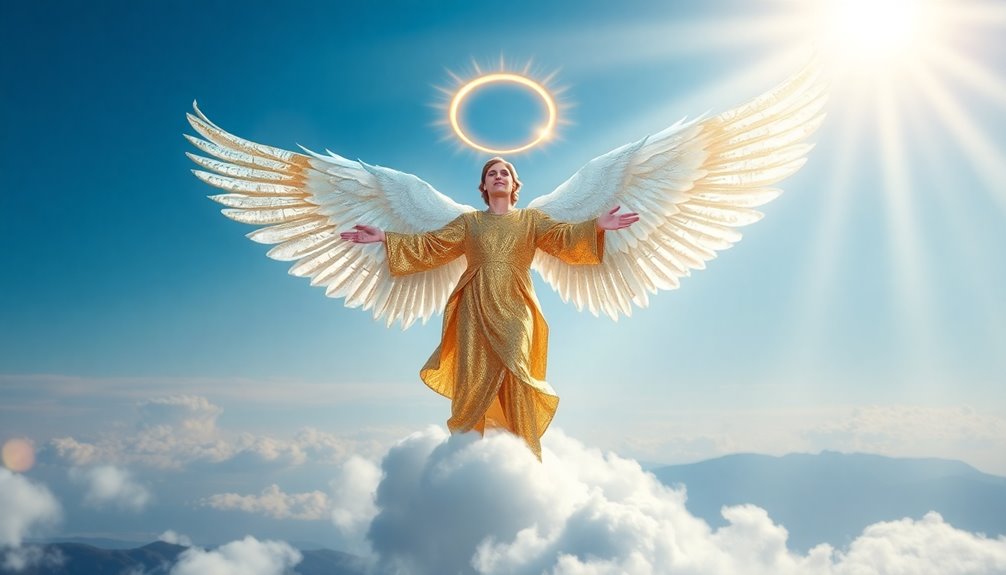
Archangels embody distinct roles that are often symbolized through various attributes and items, making their significance clear in religious iconography.
For instance, Michael the archangel represents protection with his sword, a powerful symbol of strength and defense against evil forces. When you think of Raphael, picture him with a staff or a fish, signifying healing and guidance, reminding you of the divine support available for your well-being.
Gabriel stands out as the messenger archangel, often depicted holding a scroll or trumpet. This imagery emphasizes his role in delivering divine messages, connecting you to the spiritual realm.
Uriel, on the other hand, is commonly shown with a book or scroll, symbolizing wisdom and enlightenment. This reminds you of the importance of seeking knowledge on your spiritual journey.
The radiant light and wings often associated with archangels highlight their celestial nature, reinforcing their roles as intermediaries between God and humanity.
Together, these symbols—courage, healing, guidance, and protection—remind you of the archangels' vital presence in your life and their commitment to supporting your spiritual path.
Archangels in Different Religions
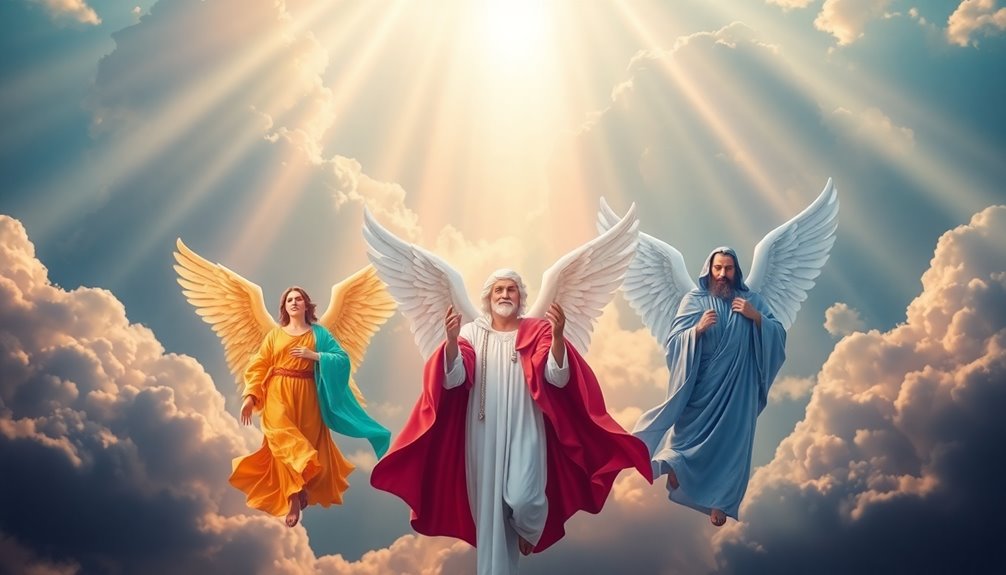
When you explore archangels across various religions, you'll uncover some fascinating cultural interpretations and common misconceptions.
For instance, while many see archangels as simply messengers, their roles can vary widely, from protectors to healers.
Understanding these differences not only enriches your knowledge but also helps debunk myths surrounding these powerful beings.
Debunk Common Archangel Misconceptions
Misconceptions about archangels often stem from the varying interpretations found in different religions. In Christianity, only three archangels—Michael, Gabriel, and Raphael—are officially recognized, while figures like Uriel appear in apocryphal texts but aren't part of the canonical scriptures. This can lead you to believe that all traditions see the same archangels when they don't.
Judaism acknowledges Michael and Gabriel as archangels, yet also references Metatron in Kabbalistic traditions, which adds another layer to the understanding of these celestial beings.
In Islam, four archangels are named: Jibrail (Gabriel), Mikail (Michael), Israfil, and Azrail. Each has distinct roles, differing significantly from the Christian and Jewish views.
Eastern Orthodox Christianity venerates seven archangels, focusing on Michael and Gabriel, while Protestant denominations generally recognize just Michael and Gabriel, often overlooking Raphael and Uriel.
This leads to discrepancies in how archangels are viewed across various Christian sects. Understanding these differences helps clarify that the title "archangel" doesn't universally apply to the same figures in every faith tradition, challenging common misconceptions you might encounter.
Cultural Interpretations of Angels
The rich tapestry of cultural interpretations surrounding angels reveals deep-rooted beliefs that vary significantly across religions. In Christianity, archangels like Michael the archangel, Gabriel, and Raphael play distinct roles; Michael is often seen as a protector, while Gabriel serves as a messenger, and Raphael is associated with healing.
Judaism also acknowledges archangels, particularly Michael and Gabriel, and recognizes seven archangels, with Metatron holding a significant place in Kabbalistic traditions.
In Islam, archangels such as Jibrail (Gabriel) and Mikail (Michael) have specific responsibilities laid out in the Quran, including Israfil, who's tasked with blowing the trumpet, and Azrail, the angel of death.
The Eastern Orthodox Church venerates the seven archangels, celebrating the Synaxis of Archangel Michael on November 8, highlighting their cultural significance.
Coptic Orthodox beliefs place a strong emphasis on St. Michael, featuring unique traditions and prayers that underscore his protective role in their spiritual practices.
Across these diverse faiths, the reverence for archangels reflects a shared understanding of their importance in guiding, protecting, and communicating the divine.
Archangels in Daily Life

Incorporating archangels into your daily life can transform your spiritual practice.
You might find that daily angelic guidance practices, like prayer or meditation, provide clarity and support.
Joining community prayer gatherings can also deepen your connection and enhance the collective energy of your intentions.
Daily Angelic Guidance Practices
Connecting with archangels daily can transform your life, offering guidance and support tailored to your needs. Engaging in daily practices such as prayer and meditation invites their presence into your life. For instance, you can call upon Archangel Michael for protection during challenging moments, or Archangel Gabriel for clarity in communication.
To deepen your connection, set aside a few minutes each day for quiet reflection. This time allows you to tune into the spiritual energies surrounding you, fostering awareness of the archangels' guidance. Incorporating crystals into your practices can amplify this connection; consider using amethyst for spiritual insight or rose quartz to enhance healing energies from Archangel Raphael.
Keeping a journal is another powerful tool. After invoking the archangels, jot down any insights or signs you experience. This practice helps you recognize their messages more effectively.
Community Prayer Gatherings
Unity thrives in community prayer gatherings, where individuals come together to invoke the presence of archangels like Michael, Gabriel, and Raphael. These events create a powerful atmosphere for participants seeking protection, guidance, and healing.
When you engage in collective worship, you can incorporate specific prayers or rituals dedicated to these archangels, enhancing your spiritual connection with others.
During gatherings, Michael the archangel is often called upon for protection, while Gabriel is invoked for clarity in communication, and Raphael is sought for healing. This targeted approach fosters a shared intention among attendees, deepening the sense of community.
Celebrating Feast days, such as the joint observance of these archangels on September 29, further strengthens these bonds, encouraging participation and collective reflection.
Archangels' Daily Relevance Highlighted
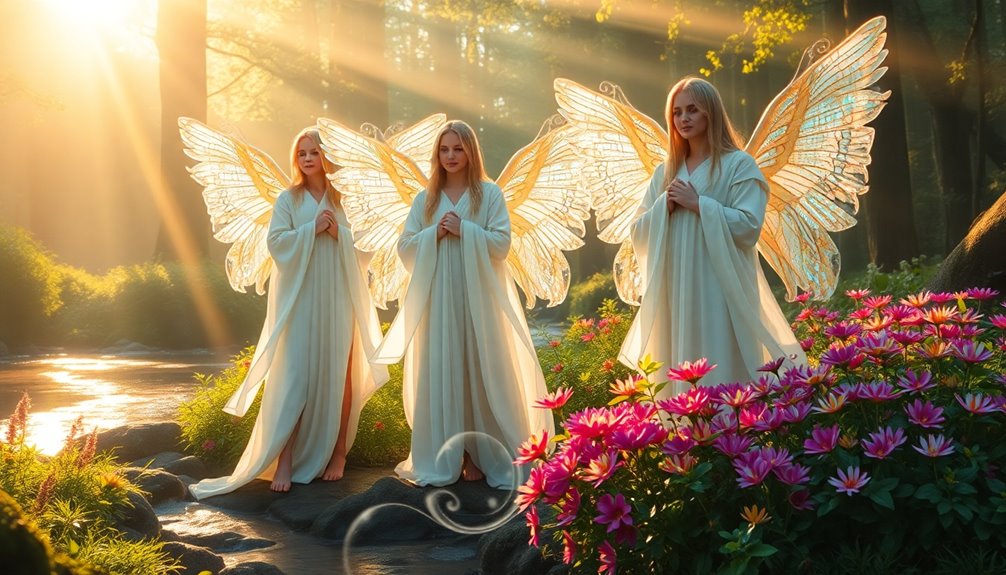
Throughout your day, archangels like Michael, Gabriel, and Raphael can play a significant role in your life. These divine guides offer spiritual support and protection, helping you navigate everyday challenges.
When you face fears or uncertainties, calling on Michael can provide the strength and courage you need. His presence is a powerful source of protection, reminding you that you're not alone.
If you're looking to enhance your communication or creativity, Gabriel is the archangel to connect with. By inviting his energy into your life, you can open pathways for inspiration and expression.
On the other hand, if wellness and healing are your focus, Raphael is there to support your journey toward health and vitality.
Incorporating daily practices like mindfulness and intention-setting can deepen your connection with these archangels. As you engage in prayer or meditation, you cultivate a spiritual environment that invites their guidance into your routine.
Recognizing their influence in your life encourages personal empowerment and aligns you with love and positivity. Embracing the relevance of archangels can transform your daily experiences, making them richer and more meaningful.
Additional Resources
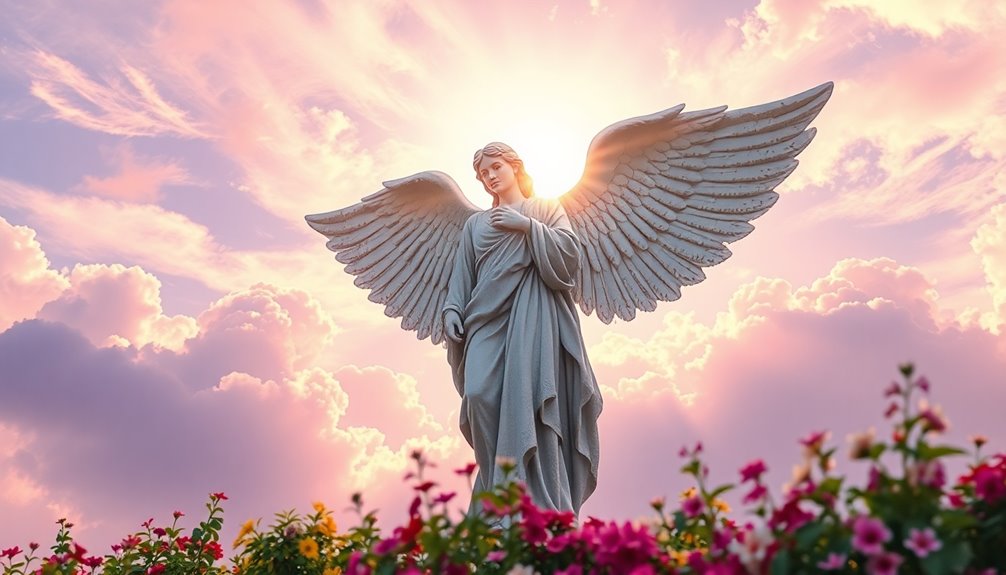
Exploring additional resources can deepen your understanding of archangels and their roles in spiritual practice. You might start by delving into religious texts, like the Bible, which mentions archangels in 1 Thessalonians 4:16 and Jude 1:9. These scriptures highlight the significance of archangels, particularly Michael, who's recognized for his protective qualities.
Consider exploring the Catholic tradition, where archangels like Gabriel and Raphael serve specific functions—messaging and healing, respectively. In Islamic teachings, Jibrail (Gabriel) and Mikail (Michael) also play vital roles, showcasing the diverse interpretations of angels as archangels across cultures.
Art and literature are rich with depictions of archangels, often illustrated with wings and radiant light, symbolizing their divine connection to God's love. Engaging with spiritual literature can provide insights into invoking archangels for guidance and protection in your daily life.
You might also find meditation and prayer practices focusing on archangels beneficial. These resources can enhance your spiritual journey, making it easier to connect with these powerful beings and understand their influence in your life.
Frequently Asked Questions
Who Are the Archangels and What Do They Do?
When you think about archangels, you're considering powerful spiritual beings with distinct roles.
Michael's your protector, leading divine armies against evil. Gabriel acts as a messenger, delivering crucial messages from God, while Raphael focuses on healing and guidance, especially for travelers.
Each one plays a unique part in fulfilling divine will, offering support and strength to those who seek their assistance in life's challenges.
What's the Difference Between an Angel and an Archangel?
Angels and archangels differ mainly in rank and purpose.
While angels serve as messengers and protectors, archangels hold higher authority and take on significant roles, like delivering important messages or leading spiritual battles.
You might think of angels as individual helpers, whereas archangels, like Michael and Gabriel, have distinct identities and responsibilities that set them apart.
Their specialized roles reflect a hierarchy within the celestial realm, showcasing their unique importance.
Are Archangels Guardian Angels?
No, archangels aren't guardian angels.
While both are celestial beings, their roles differ significantly. Archangels handle larger spiritual tasks and missions, like delivering divine messages or leading spiritual battles.
In contrast, guardian angels focus on your personal guidance and protection throughout your life.
What Does It Mean to Be Called an Archangel?
Being called an archangel means you hold a significant role in the divine order, serving as a chief messenger of God.
You're entrusted with important missions, often involving guidance, protection, and communication with humanity.
This title indicates a close connection to the divine will, placing you in a position of authority over other angels.
You're expected to lead in spiritual matters, particularly during times of conflict or when delivering vital revelations.

